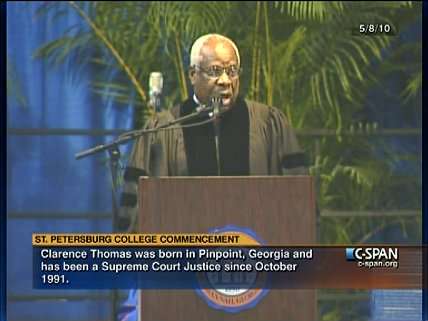Clarence Thomas and Sonia Sotomayor Join Forces in Gun Case Dissent
The Supreme Court rules 6-2 in Voisine v. United States.
In a 6-2 opinion issued today, the U.S. Supreme Court extended a federal statute which bans firearm possession by any person convicted of a "misdemeanor crime of domestic violence" to cover those individuals who have "misdemeanor assault convictions for reckless (as contrasted to knowing or intentional) conduct."
As Justice Elena Kagan explained in her majority opinion today in Voisine v. United States, "the federal ban on firearms possession applies to any person with a prior misdemeanor conviction for the 'use…of physical force' against a domestic relation. That language, naturally read, encompasses acts of force undertaken recklessly—i.e., with conscious disregard of a substantial risk of harm."

Writing in dissent, Justice Clarence Thomas, joined by Justice Sonia Sotomayor, rejected the majority's "overly broad conception of a use of force." In the Thomas-Sotomayor view, "the majority blurs the distinction between recklessness and intentional wrongdoing" and thereby does a grave injustice to criminal defendants.
It's not every day that you find Clarence Thomas and Sonia Sotomayor standing together against the rest of the Court. But the two found common ground today in a case that pitted the rights of unpopular criminal defendants against an expansive interpretation of federal law enforcement power.
Thomas and Sotomayor did not agree on everything about this case, however. Writing only for himself, Thomas also faulted the majority for adopting a statutory interpretation that puts Second Amendment rights at risk. As Thomas noted, the federal statute at issue "is already very broad. It imposes a lifetime ban on gun ownership for a single intentional nonconsensual touching of a family member. A mother who slaps her 18-year-old son for talking back to her—an intentional use of force—could lose her right to bear arms forever if she is cited by the police under a local ordinance. The majority seeks to expand that already broad rule to any reckless physical injury or nonconsensual touch. I would not extend the statute into that constitutionally problematic territory." Sotomayor did not join that part of Thomas' dissent.
The Supreme Court's opinion in Voisine v. United States is available here.
